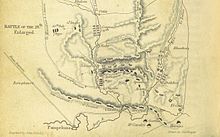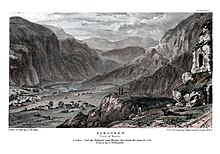This article includes a
list of references,
related reading, or
external links, but its sources remain unclear because it lacks
inline citations. (May 2011) |
| Battle of Sorauren | |||||||
|---|---|---|---|---|---|---|---|
| Part of Peninsular War | |||||||
 Battle of the Pyrenees, July 28th 1813 by Thomas Sutherland | |||||||
| |||||||
| Belligerents | |||||||
|
|
| ||||||
| Commanders and leaders | |||||||
|
|
| ||||||
| Strength | |||||||
| 24,000 men | 30,000 men | ||||||
| Casualties and losses | |||||||
| 2,600 dead or wounded | 4,000 dead or wounded | ||||||
Vitoria and the Pyrenees, 1813–1814
The Battle of Sorauren was part of a series of engagements in late July 1813 called the Battle of the Pyrenees in which a combined British and Portuguese force under Sir Arthur Wellesley held off Marshal Soult's French forces attempting to relieve Pamplona.
Prelude
With sizable Anglo-Portuguese forces tied up in assaulting San Sebastián and besieging Pamplona, the new French commander Marshal Soult launched a counterattack with the Armée d'Espagne through Maya and Roncesvalles. Although the French initially enjoyed local superiority, the tough terrain combined with stubborn British and Portuguese resistance slowed the French advance to a crawl.
Battle

The main French column of about 40,000 men under Clausel and Reille marched to attack Sorauren. On the 27 July the heavily outnumbered British forces there were drawn up on the Oricain Ridge. Wellesley made a dramatic ride along the ridge in front of the cheering British and Portuguese troops and Soult postponed the attack until the next day. By the time the French attack was launched, reinforcements had arrived, bringing the total allied force to about 24,000 men.
On the 28th the fighting at the top of the ridge was bitter and bloody, but the defenders held the French off. About midday, the 6th Division arrived and Wellesley sent them to assault the French right flank. More fresh units reached the field and Soult soon ordered a withdrawal. The French suffered 4,000 casualties, while Wellesley's army lost 1,500 British, 1,000 Portuguese and 1000 Spaniards.
On the 30 July the retreat from Sorauren cost the French 3,500 casualties, as they tried to get between Wellesley's army and San Sebastián. At Beunza, 5100 Portuguese and 4000 British fended off another attempt.
Aftermath

With his momentum lost, Soult withdrew into France to prepare his defence against the imminent Allied offensive.
Sources
- Oman, Charles (1922). "Section XXXVIII: Chapter V: Soult's Retreat, July 30–31. The second battle of Sorauren". History of the Peninsular War. Vol. VI. Oxford: Clarendon Press. pp. 681–706.
- Napier, Sir William Francis Patrick (1879). "Second Battle of Sorauren". English battles and sieges in the Peninsula. London: J. Murray. pp. 315–317.
- Weller, Jac (1992). Wellington in the Peninsula.
External links
-
 Media related to
Battle of Sorauren at Wikimedia Commons
Media related to
Battle of Sorauren at Wikimedia Commons
| Preceded by Battle of the Pyrenees |
Napoleonic Wars Battle of the Sorauren |
Succeeded by Battle of Großbeeren |
